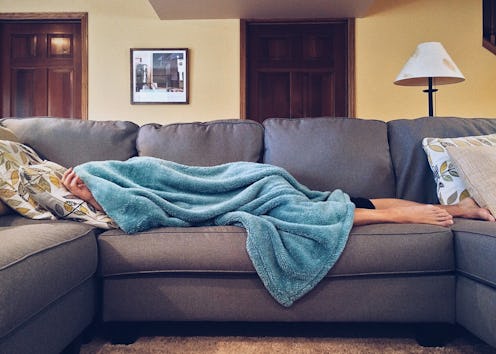Life
This Is Why You Never Have Any Dreams Anymore When You Sleep
Americans are tired — not exactly front page news. But how tired are we? New research suggests that it might be worse than we thought; in fact, a lack of REM sleep has led to dream deprivation. Yes — our sleep is so scant and of such low quality that we're not even dreaming as much. It sounds more like the plot of a Hollywood movie, but it's the reality many of us are living every day.
What Is REM Sleep?
The research was authored by Rubin Naiman of the Center for Integrative Medicine, University of Arizona; and it explores how a "silent epidemic" of insufficient REM (rapid eye movement) sleep is robbing us of the rest and recovery we need, and causing us to be as dream-deprived as we are sleep-deprived. The REM stage of sleep is where dreaming happens, but that's not all REM does. REM is also responsible for improving your brain function and creating long-term memories, according to the Liberty Center for Sound Sleep. The National Institute of Child Health and Human Development adds that REM sleep helps in learning and balancing your mood. In other words, sleep is vital to our overall wellness and wellbeing.
But dreaming in specific plays a role in sleep quality and overall health, and Naiman says science should spend more time researching how dreaming impacts the negative health affects of poor sleep. Science already knows that in some ways, dreaming has an important job. It too helps us regulate our emotions. In fact, certain treatments for depression work specifically to suppress REM and dreaming (which is a whole separate conversation).
Why Aren't We Able To Dream Enough?
Naiman explains that a variety of lifestyle factors contribute to our inability to get deep sleep and dream. One such factor is being exposed to artificial light before bedtime — like your phone or TV. Being woken up artificially is also a problem, meaning being ripped from your sleep by an annoying alarm — something that can cut directly into your dreamy sleep.
A number of other factors can cause poor sleep, too. Going to bed or waking up at different times every day is a well known no-no, because our bodies prefer routine. Sleeping in warmer temperatures can make it harder to fall asleep and stay asleep, and eating too much immediately before bedtime can also cause sleep disturbance.
What Are The Risks Of Not Hitting The Dream Stage?
Failing to hit REM sleep can undoubtedly cause you trouble; and by "trouble," we don't mean you'll be a little tired the next day. The consequences of not reaching the dream stage of sleep can be truly scary, starting with an increased risk for obesity, increased inflammatory responses, and problems with your memory. Quality sleep depravation can also lead to a lower tolerance for pain, poor coping skills, slower reflexes, and you might even be at greater risk of dementia later in life.
Are these consequences of not getting enough sleep? Yes. But Naiman argues there's a good chance they're linked to dream loss in particular.
Sure enough, although some people think dreaming is merely a byproduct of sleep, science has found a number of benefits of dreaming. It's been found to boost creativity, help you solve problems, wake up in a better mood, and help you manage your emotions, since dreaming can turn negative emotions into memories, thereby freeing us from the pain they cause.
Naiman is so sure dreaming is vital to our physical and emotional health that he believes dream loss (rather than sleep loss) is "the most critical overlooked socio-cultural force" when it comes to the study of depression.
The takeaway here is simple: sleep more, and sleep better. Despite the fact that so many people feel this way, walking around feeling like a zombie all the time is not normal. Being exhausted 24/7 is not normal. Never sleeping enough is not normal. While a lot of us sacrifice sleep for work in particular, you're not doing anyone any favors, because you can't work as well when you're sleep-deprived.
If you want to be happier, healthier, and more productive day to day, make time for sleep, no matter what you need to do.
